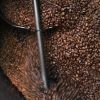A blog for the coffee lovers
Welcome to the PureBean Blog. Stay updated with our latest news & information.

Adjusting The Grinder
Any devoted coffee drinker can tell the difference between a good and a bad cup of coffee, just as any seasoned wine drinker can tell you when a vintage has started to turn into a very expensive bottle of vinegar.
Bad coffee usually goes one of two ways: it either has a sour taste or it’s too bitter. Yes, coffee can be bitter in general, but if you drink coffee every day, you’ll know when it’s bad. What you may not realize is that the beans and the coffee machine might not be to blame.
There is a distinct possibility that terrible tasting coffee starts at the grinder. There seems to be a prevalent attitude among baristas that a grinder need never be adjusted. This is an all too common fallacy that is likely responsible for more cups of bad coffee than overcooked beans and wonky machines combined.
The grind of the coffee is hugely important when it comes to creating the perfect cup of coffee every time. Here are just a few things you should know about grinder adjustment if you’re getting complaints about the taste of the coffee you serve.
The Importance of Grinding
So you’ve taken the time to curate a delectable blend of beans, you’ve spent major ducats on a top-of-the-line coffee machine, and you’ve devoted countless hours to perfecting your technique. It’s just too bad you’re ruining every cup of coffee you make by not calibrating your commercial grinder on a regular basis.
If consistency is your goal, you may mistakenly assume that calibrating your grinder once will deliver the results you seek. After all, why mess with perfection? The problem is that your grinder is susceptible to all kinds of influences that can throw it out of whack following calibration.
In other words, achieving perfection requires frequent adjusting to return your grinder to its proper state. You not only need to perform regular adjustments, but you also need to pay attention to how your coffee is coming out throughout the day and adjust as needed.
Bitterness
There are two potential outcomes when your grinder is in need of calibration. The coffee you brew will either come out strong and bitter or weak and watery. How is this related to the grind?
An optimal grind will allow for water to pass through coffee grounds at a steady rate so that the coffee produced has a flavour that is neither too strong nor too weak. The optimal time to create this perfect coffee drink will depend somewhat on your beans and your machine, so experiment until you get it right.
Once you have determined the appropriate grind and time to make an excellent coffee, you should make note of whether or not the drip is occurring too slowly. When your beans have been ground too finely, the water won’t penetrate them as quickly.
This will produce an end result that is bitter and burned. When this occurs, it’s definitely time to adjust your grinder.
Weakness
If beans are ground too coarsely, the exact opposite can occur. The water will pass through more quickly, leaving essential flavour behind. This will result in coffee that is weak, watery, and somewhat sour.
You can add all the cream, sugar, and syrup you want, but no amount of flavour additives and foam art will disguise a bad cup of coffee from someone who knows what a good cup tastes like. Whether your coffee is brewing too fast or too slow, you need to adjust your grinder to account when inconsistencies occur.
When to Calibrate
Immediately abandon the notion that you only have to calibrate your grinder once. Anyone who propagates this myth is not paying close enough attention to the results of their brewing.
A frequently used grinder should be calibrated frequently; for a coffee shop this amounts to a minimum of once each day. Your grinder should also be calibrated if you notice the grind is too coarse or fine (resulting in different brew times and coffee that is burned or weak).
In addition, you may notice that particularly warm, humid conditions affect your coffee grounds. This is because the grounds absorb some of the water in the air, affecting your brew. If you know you’re in for humid weather, make sure to pay attention to your grounds and brew times so that you can adjust your grinder as needed.





